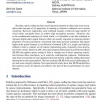Free Online Productivity Tools
i2Speak
i2Symbol
i2OCR
iTex2Img
iWeb2Print
iWeb2Shot
i2Type
iPdf2Split
iPdf2Merge
i2Bopomofo
i2Arabic
i2Style
i2Image
i2PDF
iLatex2Rtf
Sci2ools
144
click to vote
BMVC
2010
2010
Learning Directional Local Pairwise Bases with Sparse Coding
Recently, sparse coding has been receiving much attention in object and scene recognition tasks because of its superiority in learning an effective codebook over k-means clustering. However, empirically, such codebook requires a relatively large number of visual words, essentially bases, to achieve high recognition accuracy. Therefore, due to the combinatorial explosion of visual words, it is infeasible to use this codebook to represent higher-order spatial features which are equally important in capturing distinct properties of scenes and objects. Contrasted with many previous techniques that exploit higher-order spatial features, Local Pairwise Codebook (LPC) is a simple and effective method to learn a compact set of clusters representing pairs of spatially close descriptors with k-means. Based on LPC, this paper proposes Directional Local Pairwise Bases (DLPB) that applies sparse coding to learn a compact set of bases capturing correlation between these descriptors, so to avoid the...
Related Content
| Added | 10 Feb 2011 |
| Updated | 10 Feb 2011 |
| Type | Journal |
| Year | 2010 |
| Where | BMVC |
| Authors | Nobuyuki Morioka, Shin'ichi Satoh |
Comments (0)

